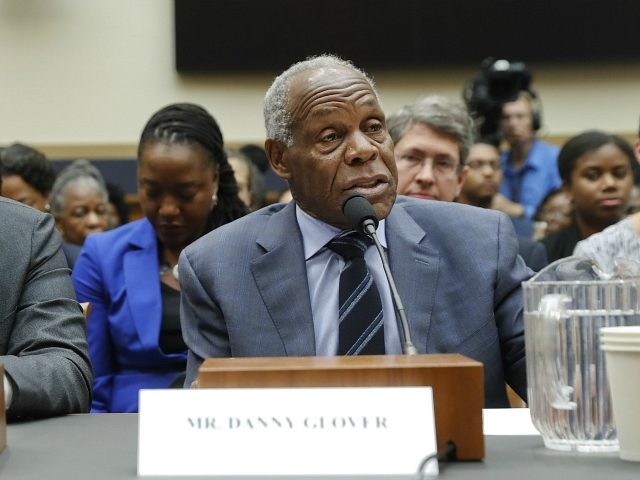Hollywood actor and left-wing activist Danny Glover on Wednesday testified before Congress that instituting a national policy on reparations for descendants of Africans enslaved in the United States is a “moral, democratic, and economic imperative.”
The House Judiciary Subcommittee on Constitution, Civil Rights and Civil Liberties welcomed Glover, Sen. Cory Booker (D-NJ), author Ta-Nehisi Coates, and others to discuss reparations in the wake of subcommittee member Rep. Sheila Jackson Lee (D-TX) reintroducing H.R. 40 to establish a commission to study reparations. In his prepared remarks, Glover called the hearing “historic,” expressing appreciation for being given the opportunity to offer his views on what he called a “reckoning of a crime against humanity that is foundational to the development of democracy and material well-being” of the United States.
Actor Danny Glover says House reparations hearing is an "important step" to "cure reparations for the damages inflicted by enslavement and forced racial exclusionary policies" https://t.co/c5XgfQ11gx pic.twitter.com/NjP91vHLPS
— CBS News (@CBSNews) June 19, 2019
“A national reparations policy is a moral, democratic, and economic imperative,” he told lawmakers, before detailing his lineage as a descendant of former slaves. “I sit here as a great-grandson of a former slave, Mary Brown, who was freed by the Emancipation Proclamation of January 1st, 1863. I had the fortune of meeting her as a small child.”
He continued: “Despite much progress over the last centuries, this hearing is yet another important step in the long and heroic struggle of African-Americans to cure the damages inflicted by enslavement, post-emancipation and forced racial exclusionary policies.”
The hearing comes amid a growing discussion in the Democrat Party about reparations. Several of the party’s presidential candidates have endorsed looking at the idea, though they have stopped short of endorsing direct payouts for African Americans.
In a Point Taken-Marist poll conducted in 2016, 68 percent of Americans said the country should not pay cash reparations to African American descendants of slaves to make up for the harm caused by slavery and racial discrimination. About 8 in 10 white Americans said they were opposed to reparations, while about 6 in 10 black Americans said they were in favor.
Senate Majority Leader Mitch McConnell (R-KY) said Tuesday that he opposes reparations, telling reporters: “I don’t want reparations for something that happened 150 years ago. We’ve tried to deal with the original sin of slavery by passing civil rights legislation.”
“It would be hard to figure out who to compensate” for slavery, the Kentucky Republican noted. “No one currently alive was responsible for that.”
Republicans have invited two witnesses to Wednesday’s hearing. One is Coleman Hughes, a young columnist who has rejected reparations and affirmative action. The other is Burgess Owens, a former Oakland Raiders football player and Super Bowl champion, who recently wrote a Wall Street Journal editorial eschewing reparations. “Proponents of reparations act as though black Americans are incapable of carrying their own burdens, while white Americans must bear the sins of those who came before,” he wrote.
The Associated Press contributed to this report.

COMMENTS
Please let us know if you're having issues with commenting.